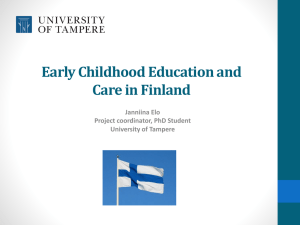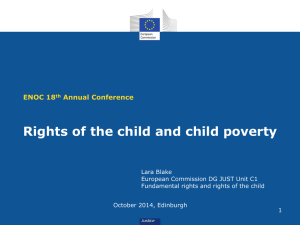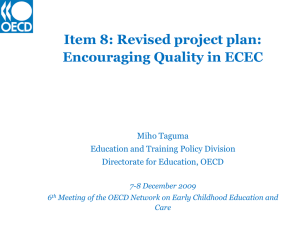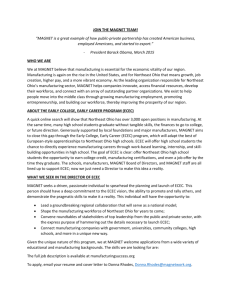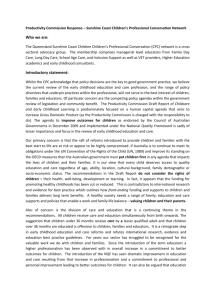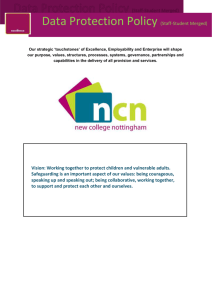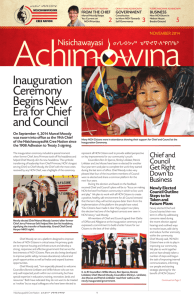Northern Children`s Network Inc (NCN) is a multi
advertisement
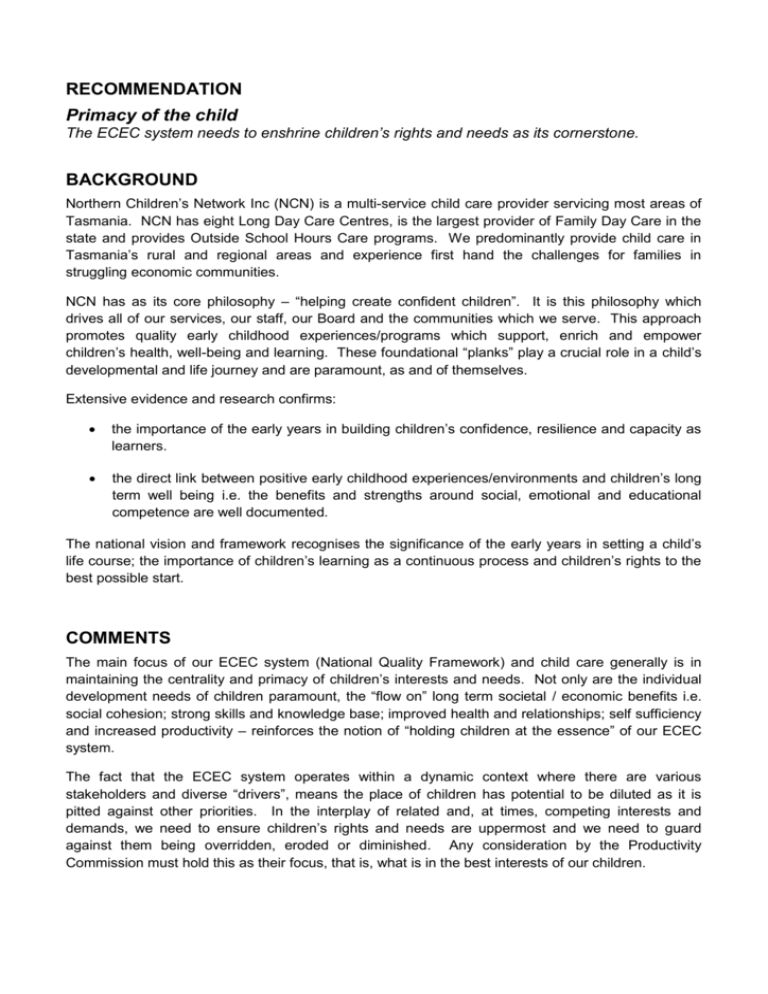
RECOMMENDATION Primacy of the child The ECEC system needs to enshrine children’s rights and needs as its cornerstone. BACKGROUND Northern Children’s Network Inc (NCN) is a multi-service child care provider servicing most areas of Tasmania. NCN has eight Long Day Care Centres, is the largest provider of Family Day Care in the state and provides Outside School Hours Care programs. We predominantly provide child care in Tasmania’s rural and regional areas and experience first hand the challenges for families in struggling economic communities. NCN has as its core philosophy – “helping create confident children”. It is this philosophy which drives all of our services, our staff, our Board and the communities which we serve. This approach promotes quality early childhood experiences/programs which support, enrich and empower children’s health, well-being and learning. These foundational “planks” play a crucial role in a child’s developmental and life journey and are paramount, as and of themselves. Extensive evidence and research confirms: the importance of the early years in building children’s confidence, resilience and capacity as learners. the direct link between positive early childhood experiences/environments and children’s long term well being i.e. the benefits and strengths around social, emotional and educational competence are well documented. The national vision and framework recognises the significance of the early years in setting a child’s life course; the importance of children’s learning as a continuous process and children’s rights to the best possible start. COMMENTS The main focus of our ECEC system (National Quality Framework) and child care generally is in maintaining the centrality and primacy of children’s interests and needs. Not only are the individual development needs of children paramount, the “flow on” long term societal / economic benefits i.e. social cohesion; strong skills and knowledge base; improved health and relationships; self sufficiency and increased productivity – reinforces the notion of “holding children at the essence” of our ECEC system. The fact that the ECEC system operates within a dynamic context where there are various stakeholders and diverse “drivers”, means the place of children has potential to be diluted as it is pitted against other priorities. In the interplay of related and, at times, competing interests and demands, we need to ensure children’s rights and needs are uppermost and we need to guard against them being overridden, eroded or diminished. Any consideration by the Productivity Commission must hold this as their focus, that is, what is in the best interests of our children. RECOMMENDATION Innovation and Creativity We need an ECEC system which embraces innovation and creativity, both at the service delivery level and at the service structure/design level. BACKGROUND Central to the theme of innovation and creativity is a freedom and professional autonomy to pursue new horizons and frontiers. We need to minimise or remove barriers which may stifle educator/service creativity – and adversely affect morale and motivation. NCN has a strong commitment to innovation and an ongoing record of creative engagement, both in terms of individual staff/educator practices and in terms of service development and service renewal or reconfiguration. Our organisation has supported the development of ECEC services in rural, isolated areas of high need; has been proactive in its desire to meet gaps in service delivery while advocating strongly for local community ownership and direction of services. AN example is the establishment of a Long Day Care Centre at Bicheno on Tasmania’s East Coast. From initial community request to the actual building has been a fifteen year journey involving the Bicheno community and NCN. NCN provided a range of child care options and creative responses to community needs during this long process. It was through this creative and persistent approach that enabled Bicheno to secure its own Long Day care Centre on school grounds. This enabling, capacity building approach has seen services take on the flavour of the local communities in which they operate. NCN has also successfully responded to community requests for assistance in remodelling services to ensure their sustainability and viability – at times when such services were on the “brink” of closure and local communities were facing the loss of a valued, important service. NCN designed and implemented the Tasmanian Home Based Care Network program (2010-2012) which was an innovative Workforce Participation initiative aimed at assisting unemployed people to become registered as Family Day care educators and commence studies towards a formal qualification in children’s services. COMMENTS Inventiveness and creative engagement at all levels is crucial in preparing children for the future and in developing early childhood services which are responsive to diverse and changing family/community needs. The ECEC system can play a major part in equipping children with critical thinking abilities; encouraging curiosity and imaginative approaches; promoting independent decision making and problem solving – vital attributes in becoming confident, able adults and vital qualities for success in a dynamic society and an economy which is becoming increasingly innovative and knowledge driven. Our ECEC system needs to welcome service initiative and resourcefulness and inspire confidence regarding new opportunities and possibilities and encourage “bottom up” proposals around non mainstream or “outside the square” service options. A pioneering spirit is a hallmark of growth and “moving forward” and listening/acting on unmet needs. Innovative solutions put forward by service providers warrant keen consideration; open dialogue and shared discussion. The first response by Regulatory Authorities should not be that it is ‘outside the framework’ but “how will this help the child and their family?” Providers and regulators need to work collaboratively in the endeavour to serve children, families and local communities. There needs to be courage to try and embrace ‘different’ models that fall outside current strictures of regulation. Page 1 of 11 RECOMMENDATION Flexible Service Models We need an ECEC system which can accommodate a blend of programs/services that better meet families/communities varied needs. BACKGROUND NCN’s experience highlights the need for flexible, innovative ECEC models which are responsive to local family and community needs. These needs are many and varied and do not always neatly “fit” within the narrow confines of service types currently funded. Changes in employment patterns; family composition; population movement and level of extended family support, are some of the factors contributing to a shift in care requirements/needs. Increasingly care requests, particularly in the home based care arena, include or encompass early starts; late finishes; split shifts; rotating shifts; casual care; before school care; emergency care; “sporadic” blocks of care (e.g. practical study placements; seasonal work). These needs are not easily met via Family Day Care for a variety of reasons: including: educators electing to operate more conventional “standard” hours to meet own work/life balance needs and parenting responsibilities. lack of spaces with the pool of educators who are willing to work more flexible hours. educator preference for what may be perceived as less complicated care arrangements. lack of spaces in area(s) nominated by parents and their reluctance to travel. lack of vacancies in the age group or on the days of care required. shortage of educators generally. The issue is heightened where care is being sought for siblings i.e. two (2) or more children in the one family. However, while the mix of needs/requests may fall within In Home Care service parameters, the issue of affordability constantly arises unless family composition includes two (2) or more children. We also service remote, isolated areas where service coverage and availability varies. There are rural pockets where Family Day Care and In Home Care plus a Long Day Care Centre are operating – but to capacity, so no vacancies/spaces available. There are other pockets where one or other of above services operate and there are spaces available. COMMENTS We need a system which can accommodate a blend of programs/services that better meet families/communities varied needs – a system which respects the different shapes; sizes and textures of local areas and does not assume a “one size fits all” ECEC landscape. The availability of more flexible options would have a positive impact on accessibility. Page 2 of 11 RECOMMENDATION Access to ECEC services for Children with Additional Needs There needs to be greater investment to increase access for children with additional needs, particularly vulnerable, disadvantaged and ‘at risk’ children and children with disabilities. BACKGROUND Existing avenues for funding assistance and professional and practical support such as Inclusion Support Funding (ISF) for children with disabilities has a range of impediments including: difficult to access in a timely manner; impose a heavy administrative burden on services; and is under resourced. NCN’s experience, particularly during the last eight years, highlights a growing demand and an increased number of requests for care which is responsive to the needs of children/families in the above target groups. The most significant barriers to access and/or successful integration or inclusion centre on: lack of staff/educator confidence; skills and experience. lack of sustained and ready access to specialist training and consultancy i.e., “nuts and bolts” advice/guidance. lack of access to specialist services. Inadequate funding for Inclusion support ($16.92 per hour for Centre based services and $9.00 per hour for Family Day Care) NCN trialled a Family Day Care pilot project called “Heads Up” during 2011. This project, for which NCN received a grant, was aimed at building Family Day Care educator skills in promoting and strengthening the emotional, social and mental health well being of children, 0-4 years of age, attending their services. The project was targeted to educators based in a low socio economic area of Launceston (northern region of Tasmania) and incorporated key activities of: 1. training delivered by specialist providers with expertise in children’s emotional and social wellbeing, and experience in working with young children suffering stress and trauma. 2. training & development workshops or ‘hub sessions’; 3. field visits by our Co-ordination staff; and 4. development of a resource bank. This project confirmed the need for, and value of professional development of a different type and shape when exploring “non mainstream” care needs. COMMENTS The funding provided to include children with additional needs into ECEC is woeful. It needs an immediate and dramatic increase from the current rate of $16.92 per hour for Centre based services and $9.00 per hour for Family day Care. The Centre based rate does not cover the hourly rate of our educators in our Centre based services. Such support requires well trained and experienced educators. Our Family Day Care Educators do not access it due to the poor funding, burdensome Page 3 of 11 administration and lack of ongoing support. The same is true for our Long Day Care and Outside School Hours Care services. Workforce development is also a priority – building the capacity of the ECEC community will facilitate building capacity of children with additional needs. Specialist training and consultancy around what may be considered non-traditional ECEC areas of learning becomes important if services are to adopt a meaningful integrative stance and work authentically, positively and on an ongoing basis with vulnerable “at risk” children or children with disabilities. Page 4 of 11 RECOMMENDATION Making Regulation and the National Quality Framework (NQF) real We need a system which can capture and retain the “best” of the NQF while minimising and simplifying the compliance and administrative requirements. BACKGROUND The “best” of the NQF is about shining the spotlight on children’s development and learning as well as measures to heighten quality. We support regulation of ECEC services in the interests of children’s safety and wellbeing. We also support a national approach and national standards which apply across the country and across service types. NCN, as a multi service provider, views the NQF as making it is easier to operate under one set of standards and makes for easier movement of staff between programs and ease of understanding for parents. We value the fact that the NQF is less prescriptive in the “how” of meeting requirements. We welcome the flexibility this affords services in adopting a risk assessment/management approach and taking a more proactive role in determining appropriate strategies that reflect the organisation philosophy, family and community needs and service locations. Any perception of NQF and the accompanying National Quality Standards (NQS) being “nebulous” or “unclear” would seem to be an overflow from an earlier world of extensive prescription. Undoubtedly, the “new world” assumes: service understanding, willingness and capacity to operate within a risk assessment model. the need for development of risk assessment frameworks. the need for solid evidence/recording of decisions. staff capacity and confidence to articulate and “promote” their position, strategies and decisions. Alongside these positive elements, there are also challenges. NCN embraces the intent of the NQF however the implementation has had unintended consequences. The transitioning phase to the new system has been time intensive in terms of: - “coming to grips” with the volumes of information; navigating the National Law; Regulations; Standards and Guides; interpreting language and making the connections and linkages between separate documents. - developing implementation strategies. - undertaking a comparison analysis of “old” and “new” documentation and identifying changes required. - updating operational policies and proformas. - organising and delivering training to staff/educators around NQF dimensions and future changes; and involving staff/educators in policy consultation sessions. - supporting home based care educators and centre staff in understanding NQF implications on an ongoing basis, particularly around programming and documentation of learning. - revising Quality Improvement Plans in context of NQF. - gaining an understanding of the assessment and rating system. Page 5 of 11 Our overall observation of the NQF is that it is primarily Long Day Care Centre focussed. While it can be argued that Long Day Care (LDC) has a major market share in child care, there are other service types, including Family Day Care (FDC) and Outside School Hours Care (OSHC). There seems to be an approach of ‘squeezing’ both FDC and OSHC into a LDC model. While there are some similarities there are also marked differences that are not adequately covered by the NQF. In Home Care, which is one of the services we provide, is not currently covered in the NQF. The major consequence of this LDC centred approach is evident in the Assessment and Rating process which will be addressed later in this submission. NCN would hope that the supporting systems of the NQF would be adequately resourced to both support and monitor child care services in Tasmania. It appears that the Regulatory Authority in Tasmania (which comes under the auspices of the Tasmania Department of Education) is under resourced. There have been many delays with Assessment and Ratings visits for our services, delays in receiving our Assessment and Ratings Reports as well as delays in receiving notifications of waivers. Whilst the Regulatory Authority does not meet its time lines, we as a service provider are expected to meet theirs. One most recent example of this has been in our application for waivers for our Family Day Care educators regarding ‘working towards suitable qualifications which came into effect 1st January this year. Our southern Family Day Care service – Southern Child Care Services – received a waiver with the wrong dates whereas our Northern Tasmanian Family Day Care service is yet to receive any notification at all. Our enquiries have been met with ‘we are busy and will get to it.’ Both waiver applications were submitted in November 2013. This indicates either a poorly resourced or poorly administered Regulatory Authority. The breadth of “other” legislation and national frameworks/guides which ECEC services are either subject to or encouraged to operate within, must also be recognised such as Child Protection; Work, Health and Safety; Dietary Guidelines and Physical Activity guidelines; National Health and Medical Research Council guidelines. This has significantly increased the regulatory and administrative burden for ECEC services which means staff time and resources are diverted away from actual child care. In addition, the implementation of the NQF, particularly concerning qualifications has not seen a co-ordinated or planned approach by our Tasmanian University or TAFE / VET providers in supporting our sector. An example is that our TAFE does not start operating until late February whereas we needed our Educators enrolled prior to 1st January this year. COMMENTS It is our view that although the intent of the NQF is focussed on the best outcomes for the child, it appears that the implementation of the NQF has become increasingly bureaucratic and compliance based. The ongoing notification and reporting requirements to the Regulatory Authority indicates an all-consuming compliance culture emerging. It appears that an atmosphere of penalty “panic” has emerged, i.e. services keen to avoid charges or fines or have the “big stick” applied. This approach is leading to preponderance of paperwork; forms; plans and other documentation. The administration focus seems to have escalated to new heights. It is essential that this focus does not “de-rail” the actual intent of the framework, thereby negating positive outcomes for children and families who the government is aiming to support. Compliance, while important, must not become our sole “driver” – an end in itself or our reason for being. It must not define us or become burdensome to the degree that it detracts from our service delivery to children or removes the fun, creativity and spontaneity from our “heart and soul”. Again, we need to hold strong to “what we are about” and keep children as our pivotal focus. Page 6 of 11 RECOMMENDATION Improve the Assessment and Rating System We need an Assessment and Rating system that encourages and is ‘strengths based’ rather than one that is striving for perfection. Change the overall Assessment and Rating System to a more “balanced scorecard” approach rather than the current “all or nothing” process. Also, change the term “Working Towards” to one that does not indicate failure in the media and communities eyes. The Assessment and Ratings system needs urgent review. BACKGROUND NCN has been involved in both trial Assessment & Ratings assessment visits as well as many of our services having undergone the ‘real thing’. Our experiences have left us feeling, at best, less than satisfied with a system that focuses on the minutiae of detail and seems to neglect the overall efforts of our services. We currently have one service that is “Meeting” the National Quality Standards (NQS) with the remainder that have been assessed at “Working Towards”. When you read our Assessment Reports (which are over 56 pages long in some cases) you see that in the majority of areas we are either “Meeting” or “Exceeding”. Yet, if our services receive only one “Not Met” in one criteria of one Quality Area, then regardless of our service achieving “Meeting” or “Exceeding” in all other Quality Areas, we are deemed as overall “Working Towards”. I refer to the note on the front of the Assessment and Rating Certificates that we receive: The overall rating for a service is determined by the combination of the Quality Area ratings achieved. If a service is rated below the National Quality Standard in any Quality Area, the overall rating will reflect the lowest Quality Area rating. To achieve an overall rating of Exceeding National Quality Standard, a service needs to achieve Exceeding National Quality Standard in four or more Quality Areas of which two must be from Quality Area 1, Quality Area 5, Quality Area 6 or Quality Area 7. Our experiences with the Assessment and Ratings procedures has seen the Assessors focus more on our Certificates on the wall, policies, procedures and proforma in folders. Our most recent example of an Assessment & Rating visit was during 16th and 17th January this year when our Outside School Hours Care service undertook this process. The Assessor spent less than three hours out of those two days actually observing our interactions with children. Most time was spent looking for paperwork. If the Assessment & Rating system is about our administrative capability then it should be focussed on our Administration team which supports our eight long day care centres, our state wide Family Day Care and In Home Care services as well as our various Outside School Hours Care services around Tasmania. We have had challenges to our practices regarding how to wipe children’s hands rather than focussing on total care. We have had Assessors with no background in Family Day Care assess our Southern Childcare Services – our southern Tasmania Family Day Care and In Home Care service. It appears that the Assessment and Rating System is Long Day Care Centre focussed and that centres on ‘stand alone’ Centres. There appears little scope to cater for multi service / multi site providers such as NCN. Page 7 of 11 COMMENTS Would we do this to our children in care? Does our Education system use this approach? I think not. However, this new Assessment and Rating System is said to be raising the bar in terms of child care services. NCN suggests that it is a recipe for disaster which disheartens and discourages our Child Care professionals and misinforms our families and communities. We need to provide the ECEC profession with professionals who can consistently and accurately assess and rate our service and support continuous improvement. Contract private assessment officers who are extensively trained, early childhood degree qualified and ISO 9001 audit qualified to complete the assessments. This is common practice for professionals like doctors, lawyers, psychologists. Reintroduce assessments completed by peers rather than by fulltime assessment officers who are removed from the everyday activities of services. Former licensing officers just can't take their compliance hat off and become assessment officers because: a. they either don't have appropriate qualifications or their qualifications and experience are outdated. b. they are prejudiced by their own views and experiences. c. there is NO CONSISTENCY from assessor to assessor. d. they live in their services’ community and have built up both good and bad relationships with services they are assessing. The Assessment and Ratings system should be the subject of a wholesale review. Assessment and Rating system currently stands, it rewards perfection not consistency. As the Page 8 of 11 RECOMMENDATION Improve the payment system for access to child care The current mix of Child Care Benefit / Child Care Rebate and other supporting payments is confusing and increasingly complex to administer. A single payment for child care should be implemented. BACKGROUND The current mix of benefits including the Child Care Benefit (CCB), the Child Care Rebate (CCR), and Jobs, Education and Training Child Care Fee Assistance (JET/JFA) is confusing for services and parents alike. Parents have to tread the Family Assistance Office maze to actually clarify and confirm their eligibility. Eligibility is determined based on work / study / respite circumstances as well as income levels. If the focus is on the needs of the child, then the payments system should reflect that and children with disadvantage would have better access to ECEC services to their benefit. Currently, the payments system is modelled on increasing ‘workforce participation’ particularly for women. While this can be considered a worthwhile goal it considers the care of children as challenge to be overcome to help people become productive workers. The current system provides support for those who use a large number of child care hours. While this is of benefit to many families, it can exclude children from disadvantaged families. Additionally, NCN has found that in a small number of cases, families can not pay their child care fees and yet still claim the Child care Rebate. This issue has been brought to the then Department of Education, Employment and Workplace Relation’s notice. NCN does not know if any follow up action was undertaken. COMMENTS NCN supports the Early Childhood Association’s stance on payment reform which states: The current system of child care payments and subsidies is complex, poorly targeted and in bad need of reform to meet modern workforce participation and early childhood development objectives...... The Child Care Rebate is currently not means tested. Early Childhood Australia believes that there is merit in reviewing the targeting of child care assistance through an income test. However, savings must be re-invested to support better access to early childhood education and care for children from disadvantaged families. This is important to mitigate the significant real decline in the value of the Child Care Benefit (CCB), which is indexed to Consumer Price Index (CPI), compared with average annual long day care fee increases of 7 per cent (September 2004September 2012) (DEEWR, 2013, p.7). The diminishing value of the Child Care Benefit has made it more difficult for families earning under $150,000 per year to access early childhood education and care. Income testing with budget re-investment in supporting better access for disadvantaged families has previously been supported by recommendations in the Henry Review and the Productivity Commission’s Early Childhood Development Workforce Inquiry (Australian Treasury, 2009 and Productivity Commission, p.50). However, ECA is of the view that a new model of supporting families which meets the same objectives should be considered by the Productivity Commission Inquiry into Child Care and Early Childhood Learning, which encompasses all payments and subsidies, and delivers adequate funding. In principle, ECA supports the streamlining of current child care payments into a single payment and simplifying the administration of the payments system for Government, services and parents. This necessarily requires changes to the Child Care Management System (CCMS) administered Page 9 of 11 by the Department of Human Services (DHS). We believe that the administration of child care assistance by DHS is in need of review. This should include how the payment delivery can be simplified, how the timeliness and cost in the delivery of CCMS changes can be improved, and improvement of current compliance strategies on child care assistance eligibility. ECA Submission to NATIONAL COMMISSION OF AUDIT November 2013 NCN is a member organisation and supports the advocacy work of the ECA. Page 10 of 11
